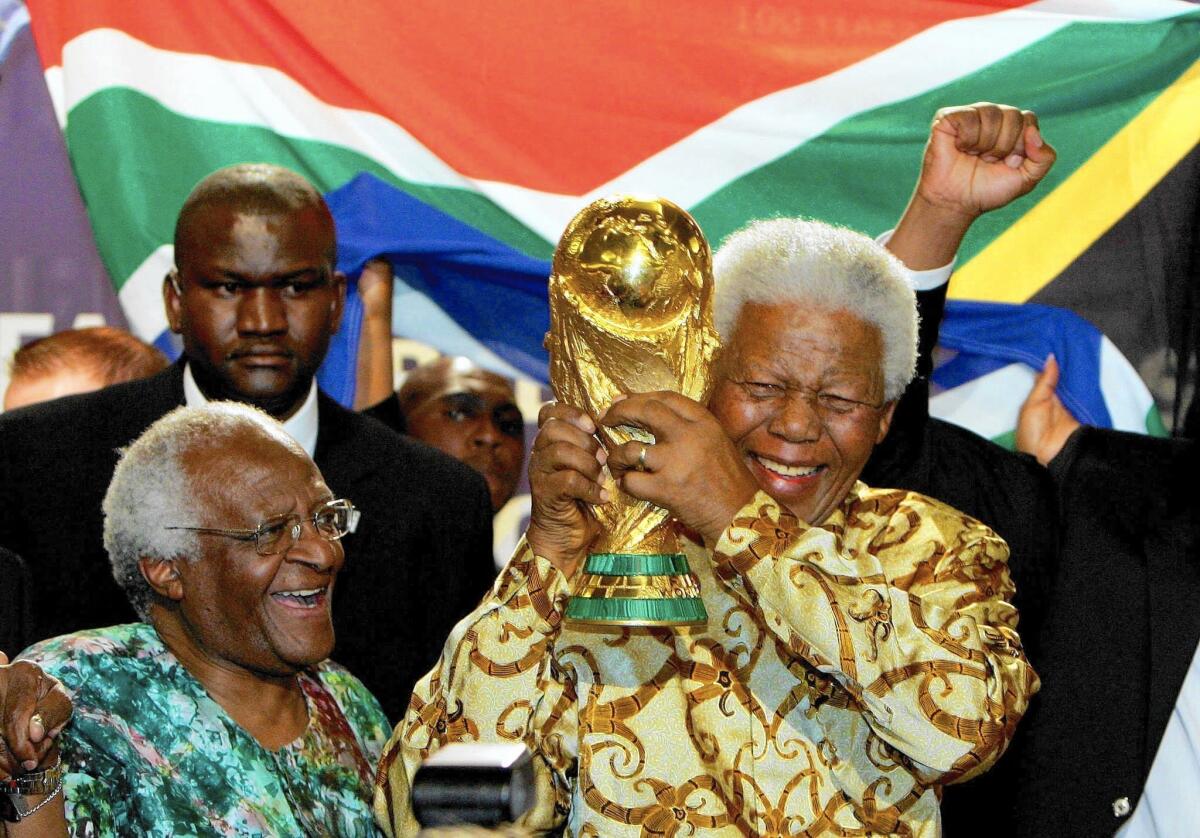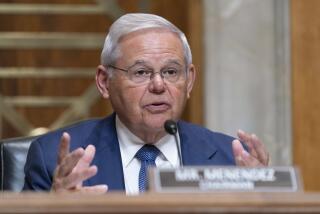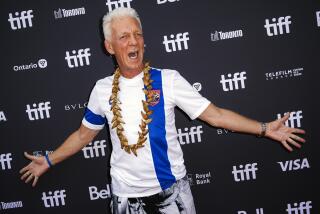South Africa is shaken by FIFA corruption probe

Nelson Mandela, with Capetown Archbishop Desmond Tutu, raises the Jules Rimet World Cup in Zurich in 2004, after
In the spring of 2004, a frail, unwell Nelson Mandela ignored his doctor’s advice and flew halfway around the globe to meet with a prominent soccer official.
The purpose of the trip to Trinidad and Tobago was simple: Mandela hoped to win Jack Warner’s support, persuading him and other officials of FIFA, soccer’s ruling body, to hold the 2010 World Cup in South Africa.
At the time, the visit seemed like a resounding success.
But a sweeping indictment unveiled by U.S. prosecutors this week paints a different picture, one in which the South African government — apparently unbeknown to Mandela — may have won the right to host the international tournament by paying at least $10 million in bribes.
On Thursday, the allegations spread anger and sadness across a country that now sees one of its proudest moments tainted.
The real damage “is to our own psyche,” wrote Stephen Grootes, a columnist for the Daily Maverick online newspaper. “It’s not just that officials had to be bribed; it’s that the World Cup was a chance for us to be a special nation again.”
South African Sports Minister Fikile Mbalula vehemently denied the charges and accused the U.S. of reaching “beyond its borders” by indicting 14 people, including Warner and eight other present and former FIFA officials, on racketeering charges.
Warner, who faces eight criminal counts in the U.S. and had surrendered to authorities in Trinidad, was granted a $395,000 bond Thursday after spending the night in jail. He left by ambulance, complaining of exhaustion, the Associated Press reported.
Much of the Department of Justice case revolves around the former FIFA vice president, including his role in the selection of South Africa to host the 2010 World Cup. There are allegations that a South African soccer official gave a briefcase stuffed with U.S. currency in stacks of $10,000 to Warner’s representative and that secretive wire transfers were made from a Swiss account to a bank in New York.
“FIFA executives and others corrupted the process by using bribes to influence the hosting decision,” U.S. Atty. General Loretta Lynch said.
With South Africa competing against Morocco and Egypt to be the 2010 host, Warner’s backing was considered vital.
Mandela was not mentioned in the indictment. His role as a lobbyist for the bid was detailed by Irvin Khoza, chairman of South Africa’s organizing committee, at a university forum in Johannesburg in 2009.
“Jack bluntly told us that if we wanted his vote, we must bring Mandela to the Caribbean,” Khoza said.
Khoza and other senior officials, including Danny Jordaan, a key figure in the bid, pressed Mandela to go, but doctors advised against the trip because the former South African president was in poor health.
“However, we finally got the go-ahead when we arranged for a special flight, two doctors and a whole lot of medical equipment to accompany Mandela,” Khoza said. “But it was not to be, when we were summoned by the government to Pretoria. Here, we were told that Mandela could not go to the Caribbean.”
Mandela eventually traveled to Trinidad and Tobago in April 2004, sparking a tug-of-war between Warner and Trinidadian government officials over who should have the right to meet him at the airport.
The South African leader arrived in Port of Spain too weak to climb the steps of a podium where he was to address a waiting crowd, the Associated Press reported at the time.
Warner reportedly boasted about Mandela traveling against doctors’ advice. Straining credibility, the FIFA official even told reporters that Mandela was concerned that violence would erupt if South Africa lost its bid for the World Cup.
“As Mr. Mandela told me, he doesn’t know what will happen if their bid fails,” Warner was quoted as saying. “They are so passionate about it, and it’s getting very dangerous.”
There was no suggestion of any threat of violence over the issue in South Africa at the time.
South Africa eventually won the right to host the event. Mandela was in Zurich for the May 2004 announcement and famously declared: “I feel like a young man of 15.”
The very different account of South Africa’s successful campaign — detailed in the U.S. indictment — dates to the early 2000s.
At one point, prosecutors say, a South African official met with a member of Warner’s family in a Paris hotel room and handed over a briefcase filled with those $10,000 bundles. The family member then flew back to Trinidad and Tobago and gave the briefcase to Warner.
The indictment also alleges that Moroccan officials had offered to pay $1 million in exchange for Warner’s vote but that South Africa subsequently upped the ante to $10 million, the money headed to a Caribbean soccer organization to “support the African diaspora.”
When South African officials later balked at paying directly from government coffers, arrangements were made to take the money from FIFA funds that were earmarked to support the World Cup, the indictment says.
Through the early weeks of 2008, prosecutors allege, installments of $616,000,
$1.6 million and nearly
$8 million were wired from a FIFA account in Switzerland to a Bank of America correspondent account in New York that was controlled by Warner.
Prosecutors say he skimmed about $1 million of that money for personal use.
Though the indictment alleges that two unnamed co-conspirators, listed as No. 15 and No. 16, were high-ranking officials from South Africa’s bid committees, Mbalula insisted Thursday that his country paid no bribes.
“We didn’t run a spaza shop or picnic,” he said, referring to small, informal convenience shops common in South African townships. “We ran a proper process. We’re clear we’ve not done anything untoward.”
Grootes expressed indignation that a beloved former leader had been dragged into the mess.
“We didn’t know then the cost,” the columnist wrote. “And particularly the cost to Nelson Mandela, shipping around the world to satisfy the craving of some two-bit crook.”
Times staff reporter David Wharton contributed to this report.
More to Read
Start your day right
Sign up for Essential California for news, features and recommendations from the L.A. Times and beyond in your inbox six days a week.
You may occasionally receive promotional content from the Los Angeles Times.






